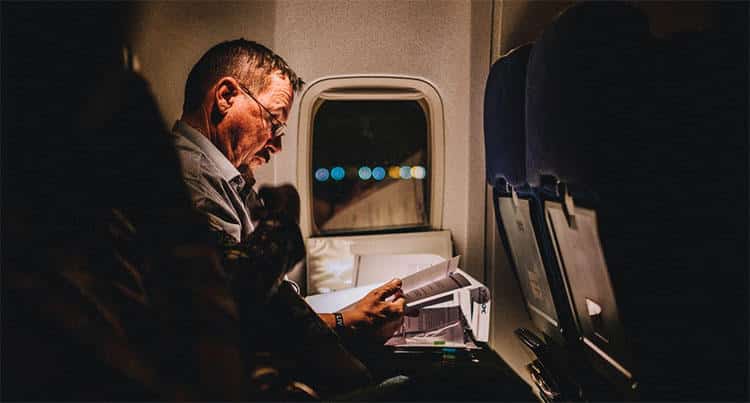Why Great Leaders Are Great Sleepers

When people think of great leaders, traits such as courageous, strategic-thinker, laser-like focus, driven, and a team player are the typical ones mentioned. While those traits are paramount to being a great leader, there is one trait that is often left out on the leadership checklist.
That trait is being a great sleeper. Sleep plays a starring role in every facet of your life and when it comes to leadership, it’s magnified ten-fold due to you needing to lead others while growing a company.
Sleep is a tricky entity because, after a certain period of chronic sleep deprivation, your body adjusts to this new state. The human mind can’t accurately sense how sleep deprived you are. This less-than-optimal state becomes your new default.
While you may initially think that since your body is getting used to this new state, it’ll be okay to continue to skimp an hour or two on your sleep. But, there’s a difference between a leader who merely exists through the day compared to a leader who performs at a high level.
With that said, when you’re sleep deprived, here are three critical areas of leadership that’s affected.
- Mental performance
Leadership requires a high level of executive brain functioning through tasks such as thinking creatively, executing with surgeon-like precision, and effectively solving problems. Furthermore, neuroscientists discovered that after 16 consecutive hours of wakefulness, executive brain functioning skills decreased.When you shorten your sleep, your ability to perform and lead effectively declines. In fact, participants who slept for six hours each night for two weeks ended up with mental abilities similar to someone who has stayed up for 24 consecutive hours according to research published in the journal Sleep. If you drop that number down to four hours each night, the same cognitive effects took only one week.
While you may hear a contingent of people boast about how little sleep they need, they’re most likely deluded in their thinking because only about five percent of the population can perform optimally on six hours of sleep or less (that small percentage of people who can have the rare DEC2 gene).
- Emotional Intelligence
A leader’s emotional intelligence is on display through discipline, empathy and compassion for others, managing relationships, and communicating in a way that empowers others. But, when you’re sleep deprived, you’re emotionally compromised.When you get a full nights sleep, there’s a healthy mix between your amygdala and prefrontal cortex which serves as the two main areas in charge of your emotional intelligence. Think of your amygdala as alerting your body to protect itself along with influencing your memory and emotions. On the other hand, think of your prefrontal cortex as influencing your logical reasoning and willpower.
A study, published in the October 2007 issue of Current Biology, had 26 participants who divided up in half. One group received a normal night’s rest while the other group was kept awake 35 hours straight. All subjects were hooked up to an MRI and shown images while researchers monitored what was going on in their brains as each of the images were shown.
The sleep-deprived group showed significant activity in the amygdala (heightened emotions) and lower activity in the prefrontal cortex (logical reasoning and willpower). The group with the normal night’s rest displayed normal brain activity.
A sleep-deprived leader is going to increase the likelihood of being moody, impatient, irritable, and less effectively gauge the needs of his team. Leaders who lack emotional intelligence can potentially create mistrust amongst their team and jeopardize the quality of those relationships.
While sleep quality is important, research appearing in the Academy of Management Journal found that daily sleep quality directly influences a leaders self-control. As for the sleep-deprived leaders, they were rated as more abusive and toxic in their interpersonal interactions.
- Presence and motivating others
Leadership requires getting others to take inspired action toward your vision, which requires effective communication. It’s been said that effective communication is seven percent the actual words being stated and ninety-three percent our tone and body language.
With that in mind, sleep deprivation lowers your ability to motivate because your presence weakens. Your presence weakening is from being sleep deprived, which affects your ability to be charismatic according to a study published in the Journal of Applied Psychology.
Since your charisma is less than normal, there’s likely to be a decrease in your overall mood and energy which trickles down to your ability to communicate effectively. All of these factors create a leader who isn’t as effective at connecting with others which leads to a decrease in overall team performance.
How to become a great sleeper
At times, it may seem impossible to consistently get quality sleep on top of your busy and demanding lifestyle. But, the good news is becoming a great sleeper has very little to do with skill and much more to do with getting organized and mastering the basics.
To improve your sleep, start incorporating these habits:
- Get in sync with your regular sleep-wake cycle by setting a regular bedtime and waking up at the same time.
- Increase your light exposure during the day and decrease your exposure to blue light at night.
- Incorporate some type of relaxation method to help unwind from the day (meditation is a great option).
- Create a night routine 90 minutes before your estimated time of sleeping so you can effectively map out tomorrows day and unwind from the day
Have you read?
# Best Fashion Schools In The World For 2018.
# Best Hospitality And Hotel Management Schools In The World For 2018.
# Best Business Schools In The World For 2018.
# World’s Best Business Schools With The Most Employable Graduates For 2018.
Add CEOWORLD magazine to your Google News feed.
Follow CEOWORLD magazine headlines on: Google News, LinkedIn, Twitter, and Facebook.
Copyright 2024 The CEOWORLD magazine. All rights reserved. This material (and any extract from it) must not be copied, redistributed or placed on any website, without CEOWORLD magazine' prior written consent. For media queries, please contact: info@ceoworld.biz









